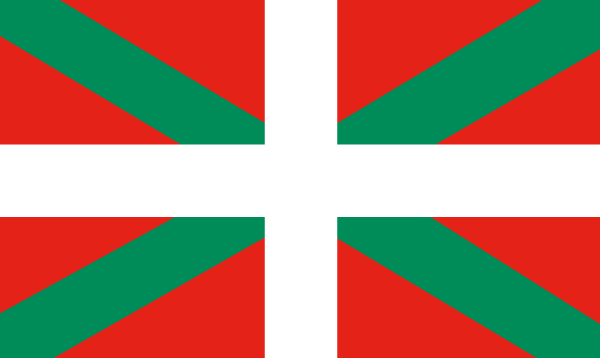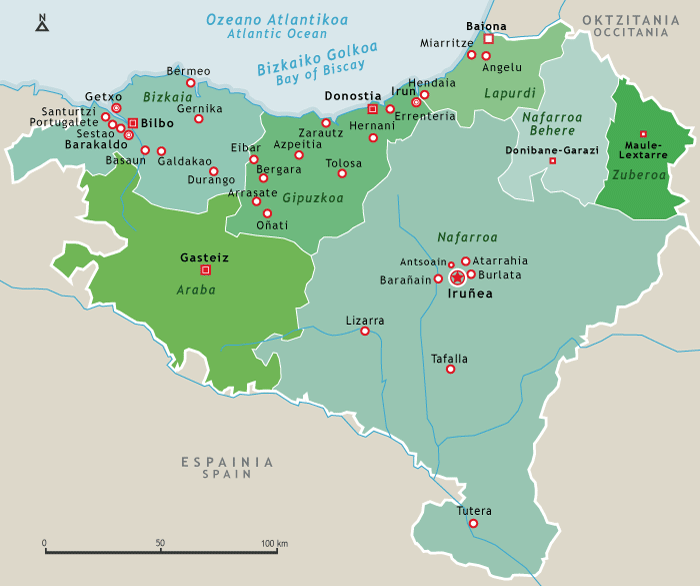The Basque Country, always fighting for their rights

Euskal Herria is the term that describes the whole of the Basque Country. It is a cultural region to the west of the Pyrénées, torn between Spain and France. Seven provinces make up this nation’s historic Bay of Biscay.

The Basques are considered descendants of the Paleolithic people of Western Europe, which makes them one of the oldest people on the continent. During Roman occupation, the Basque tribes were already present. There is no doubt that Basque was already spoken at the start of the Middle Ages between Ebra and Garonne in the region called Biscay. After the Muslim invasions and the Frankish expansion, the territory was broken up. The Basque Country known under the name of Navarre was partially annexed by the kingdom of Castille in 1512–21. However, the Basque provinces benefited from relative autonomy until the French Revolution in the north and the Carlist Wars in the south.
Despite a statute of autonomy being acquired in 1936, the civil war put an end to the first democratic advances. Guernica, the former Basque capital was bombarded by the Germans allied to the Spanish nationalists. Despite a different approach by Basque movements to achieve independence, desired by the former nationalist government, the Basque parties continued to gain the votes of their compatriots, in a context of enthusiasm for the Basque language, which is popular with them.

Identity card

| Name | Euskal Herria | Basque País Vasco | Castilian Pays basque | French (Basque Country) |
| Population | 3,155,597 inhab. (2017) |
| Area | 20,947 km² |
| Languages | Euskara | Basque Castellano | Castilian Français (official) |
| Number of native speakers | 750,000 à 1,185,500 (passive speakers) | basque (2016) |
| State of guardianship | Spain, France |
| Official status | Autonomous regions in Spain, no status in France |
| Capital | Iruñea | Basque Pamplona | Castilian (Pampelune) |
| Historic religion | Roman Cathoilic |
| Flag | Ikurrina | Basque (Symbol) |
| Anthem | Eusko Gudaria | Basque (The Basque Fighter) |
| Motto | Zazpiak bat | Basque (Seven makes one) |

Timeline

- 198 AD • The Basque Country is occupied by the Romans.
- 602 • First appearance of the name of “Vasconia”.
- 824 • Foundation of the kingdom of Navarre.
- 1200 & 1379 • Álava, Guipúzcoa and Biscay are occupied by Castille.
- 1449 & 1451 • Soule and Labourd are conquered by France.
- 1545 • First Basque book.
- 1789 • The French Revolution suppresses the freedom of the provinces (Iparralde).
- 1833–74 • Carlist Wars.
- 1841 • Paccionda Law: end of the kingdom of Navarre.
- 1936–9 • Spanish Civil War. Acts of violence against the Basques.
- 1978 • Statute of Autonomy of the Southern Basque Country (Statute of Guernica).
- 1982 • Statute of Autonomy of Navarre (Ley de Amejoramiento del Fuero), revised in 2001.

Brief history

The Basque sense of identity has its source in the 9th century and is based on the Fueros charter giving people specific freedoms. Constantly torn between several states, the Basque Country maintained its liberties until the French Revolution, which abolished them in the north. In 1876, the Spanish royal power abolished them completely in the south. The Basque Nationalist Party (PNB) was born during this period. The Spanish Civil War, which started in 1936, brought Franco to power (1939). Opposed to all ideas of autonomy, his regime claimed many civilian casualties. The Basque autonomous government was exiled to Bayonne and the resistance was established. It is at this time that ETA (Euskadi ta Askatasuna) was created. In 1979, after the death of Franco, the Basque Country acquired autonomous status. However, the situation remained tense, particularly in regards to the subject of self-determination, which creates debate in Basque society.

Geography

The geography of the Basque Country is complex. The country is made up of seven historic provinces: Araba, Biscay (Bizkaia), Guipúzcoa (Gipuzkoa), making up part of the autonomous Basque community of Euskadi, Navarre, the only constituent that is an autonomous community and the three northern provinces (Labourd, Basse-Navarre and Soule). Pamplona is considered the historic capital of the Basque Country, while other towns, such as Bayonne, Bilbao, Gasteiz-Vitoria or Saint-Sebastian extend throughout the whole territory. Iparralde and Hegoalde are two names, which characterise the division of the Basque Country between two states, Spain and France. The first linked to the northern Basque Country and the second to the south. The geography of the Basque Country is also characterised by a strong toponymy marked by mountainous landscapes in the north, bordering the Atlantic Ocean and the flatter, arid landscapes of the south, particularly the nature parks and the semi-deserts of the Bardenas Reales.



Language

Euskara
The Basque language (Euskara) is an isolated case in Europe. It belongs to neither the most common Indo-European family nor the less widespread families, which are the Finno-Ugric or Turkic-Altaic languages. There are traditionally seven variants and many sub-variants. However, intercomprehension is largely possible, especially since the writing system is unified. More than 33% of Basques speak their language, which is traditionally spoken more in the north. Nowadays, in the autonomous regions (i.e. the Euskadi regions), Basque is taught as a first language in schools. Indeed, the statute of autonomy of 1979 places Basque and Castilian on equal footing and the Basques are very attached to this right. The fundamental law on the use of Euskara reinforces their rights in the field of administration, justice and public services. ETB (Euskal Telebista), a television channel created in 1984, broadcasts in Basque. In Navarre, where 10% of Basques speak their language, the government has traditionally opposed the growth of Basque, not being restricted to follow the measures which their statute of autonomy affords them, i.e. the recognition of Basque as a second language. In the north, under the French administration, the situation is more tense, with the French monolingual system of teaching leaves little room for the Basque language. The future of the Basque language will probably depend on the results of a referendum expected in the next few years in Euskadi, but only for one part of the territory.

Politics now

Basque nationalism in its modern form has existed since the 19th century. It is based on the right of the Basque people to self-determination and to their independence. The Parliament of the three autonomous provinces of Euskadi – Araba, Bizkaia and Gipuzkoa – has twice decided in favour of self-determination, in 2002 and 2006. As this right is not guaranteed in the Spanish Constitution of 1978, the issue continues to be keenly debated in the country. Many remain loyal to the Madrid government, but a majority favour more autonomy or secession and 59% of Basques are in favour of holding a referendum on the subject.
Principal Basque parties
- Eusko Alderdi Jeltzalea – Partido Nacionalista Vasco / Nationalist Basque Party (EAJ/PNV) (Separatist Social Democrat)
- EH Bildu (Revolutionary separatist)
- Eusko Alkartasuna / Basque Solidarity (indépendantiste progressiste)
- Geroa Bai (Navarre) (Progressive separatist)

